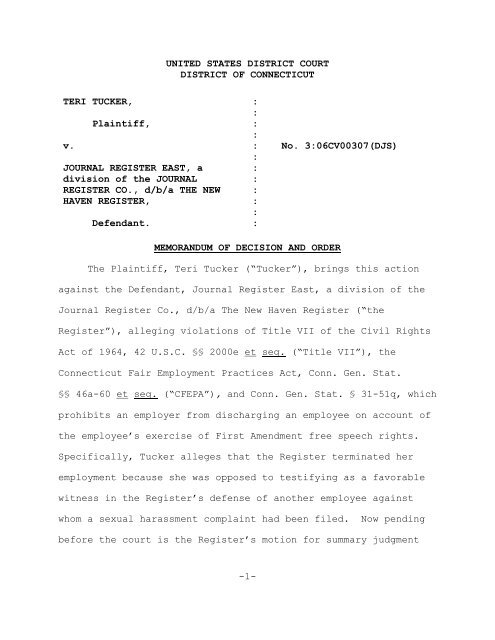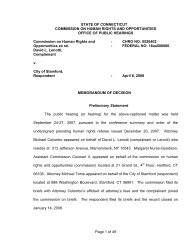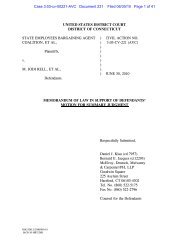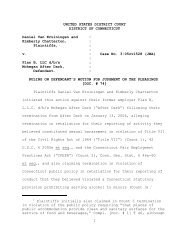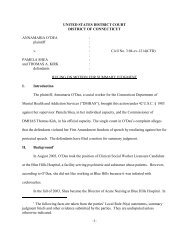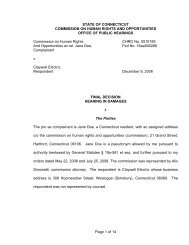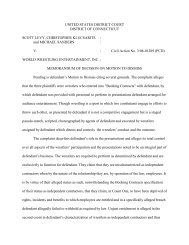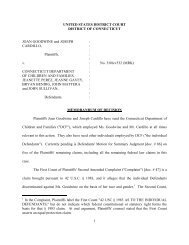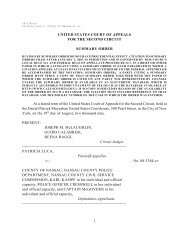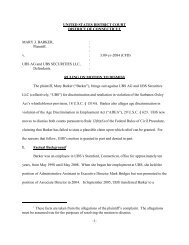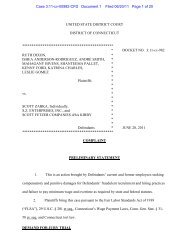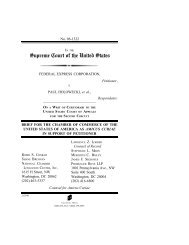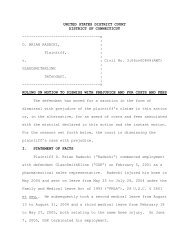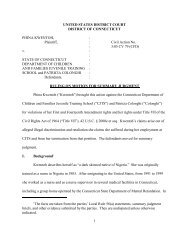Tucker v. Journal Register East - Connecticut Employment Law Blog
Tucker v. Journal Register East - Connecticut Employment Law Blog
Tucker v. Journal Register East - Connecticut Employment Law Blog
You also want an ePaper? Increase the reach of your titles
YUMPU automatically turns print PDFs into web optimized ePapers that Google loves.
UNITED STATES DISTRICT COURTDISTRICT OF CONNECTICUTTERI TUCKER,v.Plaintiff,JOURNAL REGISTER EAST, adivision of the JOURNALREGISTER CO., d/b/a THE NEWHAVEN REGISTER,Defendant.::::: No. 3:06CV00307(DJS):::::::MEMORANDUM OF DECISION AND ORDERThe Plaintiff, Teri <strong>Tucker</strong> (“<strong>Tucker</strong>”), brings this actionagainst the Defendant, <strong>Journal</strong> <strong>Register</strong> <strong>East</strong>, a division of the<strong>Journal</strong> <strong>Register</strong> Co., d/b/a The New Haven <strong>Register</strong> (“the<strong>Register</strong>”), alleging violations of Title VII of the Civil RightsAct of 1964, 42 U.S.C. §§ 2000e et seq. (“Title VII”), the<strong>Connecticut</strong> Fair <strong>Employment</strong> Practices Act, Conn. Gen. Stat.§§ 46a-60 et seq. (“CFEPA”), and Conn. Gen. Stat. § 31-51q, whichprohibits an employer from discharging an employee on account ofthe employee’s exercise of First Amendment free speech rights.Specifically, <strong>Tucker</strong> alleges that the <strong>Register</strong> terminated heremployment because she was opposed to testifying as a favorablewitness in the <strong>Register</strong>’s defense of another employee againstwhom a sexual harassment complaint had been filed. Now pendingbefore the court is the <strong>Register</strong>’s motion for summary judgment-1-
(dkt. # 25) pursuant to Rule 56 of the Federal Rules of CivilProcedure (“Fed. R. Civ. P.”). For the reasons stated herein,the <strong>Register</strong>’s motion for summary judgment (dkt # 25) is DENIED.I. FACTS<strong>Tucker</strong> filed the complaint in this matter on February 28,2006. The following facts are taken from the parties’ Local Rule56(a) statements, summary judgment briefs, depositions andexhibits.The <strong>Register</strong> hired <strong>Tucker</strong> in August 2000 as a telemarketingmanager, a position she held until October 16, 2003, when she wasterminated by Kevin Walsh (“Walsh”), the <strong>Register</strong>’s publisher andchief executive officer. <strong>Tucker</strong>’s responsibilities included thehiring and training of a staff of telemarketers, meeting salesgoals for various papers published by the <strong>Register</strong>, andoverseeing the telemarketing department.In 2002, Denise Pecoraro (“Pecoraro”), a telemarketer, fileda complaint with the <strong>Connecticut</strong> Commission of Human Rights andOpportunities (“CHRO”), claiming she was sexually harassed by hersupervisor, and one of <strong>Tucker</strong>’s subordinates, Lee Abrams(“Abrams”). Between December 2002 and February 2003, <strong>Tucker</strong>aided the <strong>Register</strong> in preparing a response to Pecoraro’s CHROcomplaint because, at the time, <strong>Tucker</strong> believed Pecoraro’saccusations against Abrams lacked merit. Additionally, <strong>Tucker</strong>,in a signed statement, represented that she had never personally-2-
observed or overheard any conversations of a sexual naturebetween Pecoraro and Abrams. At a deposition, <strong>Tucker</strong> testifiedthat her statement was entirely true at the time it was made andwas not a product of any pressure exerted by the <strong>Register</strong>.In April 2003, <strong>Tucker</strong> spoke to Abrams about sexuallyinappropriate gestures she personally observed him make in thedirection of a female co-worker as the co-worker walked pastAbrams. <strong>Tucker</strong> documented this incident in her own files, butshe did not provide the documentation of the incident to the<strong>Register</strong>’s Human Resources Department (“HR”) until several monthslater, when Abrams requested to review his personnel file. Inaddition, another female employee complained to <strong>Tucker</strong> thatAbrams has stood over her and looked down her shirt. <strong>Tucker</strong>documented the complaint in a memo for her own set of employeefiles and issued that document to Abrams as well.<strong>Tucker</strong> went on maternity leave thereafter. During thistime, allegedly due to her concern about Abram’s behavior and thedisappearance of checks in her department, <strong>Tucker</strong> investigatedAbrams’ criminal background. <strong>Tucker</strong> apparently discovered thatAbrams had been a defendant in several criminal cases in<strong>Connecticut</strong> and had been convicted of forging numerous checksbetween 1992 and 1998.On October 14, 2007, <strong>Tucker</strong> went to meet with Robert Lee(“Lee”), the HR manager. She brought with her an assembled-3-
packet containing, among other things, a copy of Abram’s criminalrecords. With regard to supporting the <strong>Register</strong> againstPecoraro’s CHRO complaint, <strong>Tucker</strong> allegedly told Lee that “myheart isn’t in this anymore after all the things I found out.”Lee allegedly replied, “you better just get your heart in it.”<strong>Tucker</strong> also claims Lee stated to her, angrily and very strongly,that “this would not look good for us with the CHRO case.”<strong>Tucker</strong> claims Lee “didn’t want to deal with [the packet].”<strong>Tucker</strong> also assembled packets about Abrams for Walsh and the<strong>Register</strong>’s circulation director, Rich Brest (“Brest”).In October, the <strong>Register</strong> initiated an investigationconcerning the acceptance of collect calls by <strong>Tucker</strong>. This wasin response to a letter penned by Abrams. The <strong>Register</strong>’sinvestigation revealed that ten collect calls were directed tothe Telemarketing Department Extension, and eight of those callsoriginated from a “Federal Correctional Institute.” <strong>Tucker</strong>contends that the calls may have been directed towards another<strong>Register</strong> employee working in the telemarketing department who hadaccess to its extension and who was having a romanticrelationship with an inmate, presumably the source of the collectcalls.On October 16, 2003, Walsh met with <strong>Tucker</strong>, along with Brestand Lee. Walsh asked <strong>Tucker</strong> if she knew a Tavis Rauls (“Rauls”),a criminal defendant and former employee of the <strong>Register</strong>, and-4-
asked whether she had written a letter on behalf of Rauls to thepresiding judge detailing Rauls’ favorable past work performanceat the <strong>Register</strong>. <strong>Tucker</strong> acknowledged that she knew Rauls and hadwritten a letter on his behalf in response to a request made bythe judge during a court hearing <strong>Tucker</strong> attended during workhours. Walsh also asked <strong>Tucker</strong> whether she had accepted anycollect telephone calls from Rauls. <strong>Tucker</strong> stated that shebelieved she had accepted one such call, but retracted thatbelief to Walsh approximately fifteen minutes later. A few hourslater, Walsh terminated <strong>Tucker</strong>’s employment.The <strong>Register</strong> contends that, prior to <strong>Tucker</strong>’s termination,Walsh was not aware of <strong>Tucker</strong>’s hesitancy to testify on behalf ofthe <strong>Register</strong> and Abrams, or that <strong>Tucker</strong> may have found merit inPecoraro’s claims. <strong>Tucker</strong> counters by alleging that as Lee was asubordinate of Walsh, Walsh could have gained knowledge of herreluctance from Lee, or that Walsh may have inferred herreluctance from the packet Brest gave to him.The impetus for <strong>Tucker</strong>’s termination is vehemently contestedby both parties. <strong>Tucker</strong> asserts she was terminated inretaliation for her hesitance to testify as a witness on behalfof the <strong>Register</strong> and Abrams. She claims her reluctance totestify, manifested by her comment to Lee, is the reason she wasterminated. Additionally, she highlights the fact that she wasnot given an opportunity to reimburse the company for the one-5-
call she may have accepted, and that the <strong>Register</strong>’s companypolicy allowed employees to use the phone system for personalreasons if they reimbursed the company.The <strong>Register</strong> claims that <strong>Tucker</strong> was terminated “foraccepting a collect call from a prison.” The <strong>Register</strong>’sinvestigation into collect call activity revealed that tencollect calls were directed to the Telemarketing DepartmentExtension, and eight of those calls originated from a “FederalCorrectional Institute.” Although there is evidence that severalother employees may have also accepted collect calls but were notterminated, the <strong>Register</strong> contends that <strong>Tucker</strong>’s conduct warrantedtermination because of her management level position, and becauseshe accepted a call from a correctional facility. In addition,Walsh cited <strong>Tucker</strong>’s “poor judgment” in writing “letters ofrecommendation on behalf of felons that were going forsentencing” as a reason for her termination.II. DISCUSSION<strong>Tucker</strong> alleges that the <strong>Register</strong>’s conduct violated Title1VII, CFEPA, and Conn. Gen. Stat. § 31-51q. The <strong>Register</strong> arguesthat <strong>Tucker</strong>’s retaliations claims fail because she has not1<strong>Connecticut</strong> courts examine federal precedent for guidance inconstruing <strong>Connecticut</strong>’s anti-discrimination statutes. See Levy v. Comm’n onHuman Rights & Opportunities, 236 Conn. 96, 103 (1996); Williams v. QuebecorWorld Infiniti Graphics, 456 F. Supp. 2d 372, 383 (D. Conn. 2006).Accordingly, the standards governing <strong>Tucker</strong>’s CFEPA and Title VII claims areone and the same. See Vasquez v. Claire’s Accessories, Inc., 392 F. Supp. 2d342, 349 (D. Conn. 2005). Therefore, the court shall analyze <strong>Tucker</strong>’s TitleVII and CFEPA retaliation claims together.-6-
established a prima facie retaliation case, and because she hasfailed to demonstrate pretext. The <strong>Register</strong> also argues that<strong>Tucker</strong>’s free speech claim fails because her speech did notpertain to a matter of public concern. The court shall discussthe <strong>Register</strong>’s arguments seriatim.A. SUMMARY JUDGMENT STANDARDA motion for summary judgment may be granted “if thepleadings, depositions, answers to interrogatories, andadmissions on file, together with the affidavits, if any, showthat there is no genuine issue of material fact and that themoving party is entitled to judgment as a matter of law.” Fed.R. Civ. P. 56(c).Summary judgment is appropriate if, after discovery, thenonmoving party “has failed to make a sufficient showing on anessential element of [its] case with respect to which [it] hasthe burden of proof.” Celotex Corp. v. Catrett, 477 U.S. 317,323 (1986). “The burden is on the moving party ‘to demonstratethe absence of any material factual issue genuinely in dispute.’”Am. Int’l Group, Inc. v. London Am. Int’l Corp., 664 F.2d 348,351 (2d Cir. 1981) (quoting Heyman v. Commerce & Indus. Ins. Co.,524 F.2d 1317, 1319-20 (2d Cir. 1975)).A dispute concerning a material fact is genuine “‘ifevidence is such that a reasonable jury could return a verdictfor the nonmoving party.’” Aldrich v. Randolph Cent. Sch. Dist.,-7-
963 F.2d 520, 523 (2d Cir. 1992) (quoting Anderson v. LibertyLobby, Inc., 477 U.S. 242, 248 (1986)). The Court must view allinferences and ambiguities in a light most favorable to thenonmoving party. See Bryant v. Maffucci, 923 F.2d 979, 982 (2dCir. 1991). “Only when reasonable minds could not differ as tothe import of the evidence is summary judgment proper.” Id.B. RETALIATIONTitle VII prohibits retaliation, by any employer, againstany of its employees who 1) oppose discrimination prohibited bythe statute, or 2) are participating in a Title VII proceeding.See 42 U.S.C. § 2000e-3(a). Retaliation claims brought pursuantto Title VII are governed by a burden-shifting analysis set forthby the Supreme Court in McDonell Douglas Corp. v. Green, 411 U.S.792, 802 (1973). See Terry v. Ashcroft, 336 F.3d 128, 141 (2dCir. 2003) (“The McDonnell Douglas burden shifting analysis usedin claims of discrimination in violation of Title VII alsoapplies to retaliation claims brought pursuant to Title VII.”)First, a plaintiff bears the burden of establishing a primafacie case. “That is, an employee must show (1) participation ina protected activity; (2) that the defendant knew of theprotected activity; (3) an adverse employment action; and (4) acausal connection between the protected activity and the adverseemployment action.” Jute v. Hamilton Sunstrand Corp., 420 F.3d166, 173 (2d Cir. 2005) (internal quotation marks omitted). “The-8-
urden of proof that must be met to permit a Title VII plaintiffto survive a summary judgment motion at the prima facie stage hasbeen characterized as ‘minimal’ and ‘de minimis.’” Id. (quotingWoodman v. WWOR-TV, 411 F.3d 69, 76 (2d Cir. 2005)). “Indetermining whether this initial burden is satisfied in a TitleVII retaliation claim, the court’s role in evaluating a summaryjudgment request is to determine only whether profferedadmissible evidence would be sufficient to permit a rationalfinder of fact to infer a retaliatory motive.” Id.Second, “[i]f a plaintiff sustains the initial burden, apresumption of retaliation arises.” Id. “[T]he onus falls onthe employer to articulate a legitimate, non-retaliatory reasonfor the adverse employment action.” Id.; see McDonnell Douglas,411 U.S. at 802 (“[T]the burden then must shift to the[defendant] to articulate some legitimate, nondiscriminatoryreason for the [adverse employment action].”) “This burden isone of production, not persuasion; it can involve no credibilityassessment.” Reeves v. Sanderson Plumbing Prods., Inc., 530 U.S.133, 142 (2000) (internal quotation marks omitted).Finally, if a defendant does articulate a legitimate,nondiscriminatory reason for the adverse employment action, theplaintiff has the ultimate burden to persuade the trier of factthat he or she was victim of illegal retaliation. Holtz v.Rockefeller & Co., Inc., 258 F.3d 62, 81 (2d Cir. 2001). That-9-
is, “the McDonnell Douglas framework--with its presumptions andburdens--disappear[s], . . . and the sole remaining issue [is]discrimination vel non . . . .” Reeves, 520 U.S. at 142-43.“[T]he plaintiff may . . . rely on evidence-circumstantial orotherwise-showing that an impermissible reason was a motivatingfactor, without proving that the employer’s proffered explanationplayed no role in its conduct.” Holtz, 258 F.3d at 81 (internalquotation marks omitted). “Ordinarily, plaintiff’s evidenceestablishing a prima facie case and defendant’s production of anondiscriminatory reason for the employment action raise aquestion of fact to be resolved by the factfinder after a trial.”Carlton v. Mystic Transp., Inc., 202 F.3d 129, 135 (2d Cir.2000). Consequently, “unless the employer has come forward withevidence of a dispositive nondiscriminatory reason as to whichthere is no genuine issue and which no rational trier of factcould reject,” the conflicting initial burdens of the two partiesnecessitates a factual determination, and summary judgment wouldbe improper. Cronin v. Aetna Life Ins. Co., 46 F.3d 196, 203(2d. Cir. 1995).1. Prima Facie CaseTo establish her prima facie case, <strong>Tucker</strong> must show that sheparticipated in a protected activity; that the <strong>Register</strong> knew ofthe protected activity; that she suffered an adverse employmentaction; and that there was a causal connection between the-10-
protected activity and the adverse employment action.2a. Protected ActivityThe <strong>Register</strong> first argues that <strong>Tucker</strong> did not opposesexually harassing behavior, oppose a directive that she testifyfalsely, or otherwise participate in a protected activity thatwould support her prima facie retaliation case. The court,however, disagrees.Title VII forbids an employer from retaliating against anemployee because she “has opposed any practice made an unlawfulemployment practice by this subchapter, or because [s]he has madea charge, testified, assisted, or participated in any manner inan investigation, proceeding, or hearing under this subchapter.”42 U.S.C. § 2000e-3(a). The <strong>Register</strong>’s main argument here isthat <strong>Tucker</strong> allegedly did not “oppose any practice” made unlawfulunder Title VII. But, as the Second Circuit has pointed out, 42U.S.C. § 2000e-3(a) “has two separate clauses: an oppositionclause as well as an independent participation clause.” Deravinv. Kerik, 335 F.3d 195, 203 n.6 (2d Cir. 2003). Thus, a claimthat “is best understood as falling under [the] participationclause . . . should not be analyzed solely under the narrower3opposition clause.” Id. That is, if <strong>Tucker</strong> has shown that her2There is no dispute that <strong>Tucker</strong>’s termination constitutes an adverseemployment action. Therefore, the court need only discuss the other threeelements of <strong>Tucker</strong>’s prima facie case.3Even <strong>Tucker</strong>’s memorandum of law is muddled when making the distinctionbetween these two clauses.-11-
conduct with regard to Pecoraro’s CHRO proceeding constitutes“participation” in a Title VII case, she has satisfied herburden. 4In Deravin, the Second Circuit held that defending oneselfagainst charges of discrimination in a Title VII proceedingconstitutes a “protected activity” within the meaning of TitleVII. Id. at 203-05. The Second Circuit noted that the TitleVII’s “participate[] in any manner” language is broad, and thatcourts have expansively construed this explicit language. Id.;see Clover v. Total Sys. Servs., Inc., 176 F.3d 1346, 1353 (11thCir. 1999). The Second Circuit also noted the Supreme Court’sholding that “‘[r]ead naturally, the word ‘any’ has an expansivemeaning,’ and thus, so long as ‘Congress did not add any languagelimiting the breadth of that word,’ the term ‘any’ must be givenliteral effect.” Deravin, 335 F.3d at 204 (quoting United Statesv. Gonzales, 520 U.S. 1, 5 (1997)). Therefore, in Deravin, theSecond Circuit found that an employee testifying in an employmentdiscrimination case concerning his own allegedly discriminatoryaction had participated in a Title VII proceeding. Id. at 205.In Jute, the Second Circuit furthered its analysis of the4The parties do not discuss whether a CHRO action constitutes “aninvestigation, proceeding, or hearing” under Title VII, and it is not clear tothe court what the specifics were of Pecoraro’s CHRO complaint. The courtnotes, however, that a CHRO action, although proceeding before a state, notfederal, agency, can nevertheless be brought pursuant to both CFEPA and TitleVII. Therefore, the court shall assume that Pecoraro’s CHRO case qualifies as“an investigation, proceeding, or hearing” under Title VII.-12-
scope of Title VII’s participation clause. There, the SecondCircuit found that an employee who was named as a voluntarywitness in support of a co-worker’s Title VII discriminationlawsuit, but was never called upon as a witness, had participatedin a Title VII proceeding. Jute, 420 F.3d at 174-76. Inconsidering the term “participate,” the Second Circuit found thatJute had satisfied the plain language of the statute. Id. at174. That is, “because the anti-retaliation clause sweepsbroadly through the phrase ‘in any manner,’” it may be plausiblyargued that “a voluntary witness who had agreed to offertestimony on matters relevant” to a Title VII case” “‘ha[d] apart’ in or an ‘association’ with the [Title VII] litigation.”Id.The Second Circuit also looked at the statute’s overallpurpose, noting thatTitle VII combats unlawful employment practices,and it does so principally through reliance on employeeinitiative. In recognition of this fact, Congressenacted the anti-retaliation clause to shield anemployee from employer retaliation following theemployee’s attempt to challenge discriminatory conduct.The Supreme Court has therefore opined that a primarypurpose of [Title VII] is to “[m]aintain[] unfetteredaccess to statutory remedial mechanisms.”Id. at 174-75 (quoting Robinson v. Shell Oil Co., 519 U.S. 337,346 (1997)). “It would be destructive of this purpose to leavean employee who is poised to support a co-worker’s discriminationclaim wholly unprotected.” Id. at 175. If courts were to find-13-
otherwise, “an employer could freely retaliate against a TitleVII whistleblower, as long as it did so before the employeeactually testified. Placing a voluntary witness into this kindof legal limbo would impede remedial mechanisms by denyinginterested parties access to the unchilled testimony ofwitnesses.” Id. (internal quotation marks omitted).5Here, <strong>Tucker</strong> alleges she was terminated because she decidednot to testify in Pecoraro’s CHRO proceeding as a witness for the<strong>Register</strong> after she had told the <strong>Register</strong> that she would testify.The court believes that, in accordance with the principles setforth by the Supreme Court in Robinson, and by the Second Circuitin Deravin and Jute, <strong>Tucker</strong>’s conduct is sufficient to qualifyas a “protected activity” under Title VII. To hold otherwisewould permit an employer involved in a Title VII proceeding toretaliate against an employee based upon that employee’s decisionas to what her participation in the Title VII would be. Indeed,<strong>Tucker</strong> would be “wholly unprotected” if the court were to find5Additionally, courts outside this Circuit, faced with factualcircumstances similar to the facts at bar, have also read the participationclause in a broad and expansive manner to honor Title VII’s remedial goals.See, e.g., Glover v. S.C. <strong>Law</strong> Enforcement Div., 170 F.3d 411, 413-14 (4th Cir.1999) (finding that the use of participation clause claim is not determinedbased on an employee’s testimony regardless of how unreasonable that testimonymay be, and to hold otherwise “would do violence to the text of that provisionand would undermine the objectives of Title VII.”); Merritt v. Dillard PaperCo., 120 F.3d 1181 (11th Cir. 1997) (holding that the anti-retaliationprovision of Title VII reaches to employees who involuntarily participate insuch proceedings and employees who do not seek to assist Title VII claimant);Smith v. Columbus Metro. Hous. Auth., 443 F. Supp. 61, 64 (D. Ohio 1997)(holding that “whether an employee decides to assist the charging party, orrefuses to assist the . . . employer, the employer may not retaliate againstthe employee, because this decision of the employee constitutes participationin an investigation or proceeding under Title VII.”).-14-
that the <strong>Register</strong> could terminate her because she had changed hermind about testifying on the <strong>Register</strong>’s behalf in the CHROproceeding.Furthermore, the court is not convinced that <strong>Tucker</strong>’sstatement to Lee (“my heart just isn’t in this anymore after allthe things I found out”) is insufficient, as the <strong>Register</strong> claims,to generate an inference that she had “assumed an adversarialposture” in the CHRO proceeding. Based on Lee’s alleged reactionto <strong>Tucker</strong>’s statement (“you better just get your heart in it”),it is possible to infer that Lee thought that <strong>Tucker</strong> was changingher mind. At the very least, the court believes that this is anissue best left to the finder of fact. Consequently, the courtfinds that <strong>Tucker</strong> has demonstrated her participation in aprotected activity that is sufficient to establish her primafacie retaliation case.b. Knowledge of the Protected ActivityThe second element of the prima facie case requires theplaintiff to show the employer was aware of this protectedactivity. “The plaintiff must show a specific basis for imputingthe [Title VII violation] to the employer.” Fitzgerald v.Henderson, 251 F.3d 345, 357 (2d. Cir. 2001). In the case at bar,<strong>Tucker</strong> is not required to put forth undisputable evidence thatthe superior who ultimately terminated her employment hadknowledge of her participation in a Title VII proceeding. That-15-
is, <strong>Tucker</strong> need not show anything more than “general corporateknowledge that the plaintiff has engaged in a protectedactivity.” Gordon v. New York City Bd. of Educ., 232 F.3d 111,116 (2d Cir. 2000); see Reed v. A.W. <strong>Law</strong>rence & Co., Inc., 95F.3d 1170, 1178 (2d Cir. 1996) (finding knowledge requirement“easily proved” because the corporate entity was aware ofplaintiff’s complaints). Furthermore, “a jury . . . can findretaliation even if the agent denies direct knowledge of aplaintiff’s protected activities, for example, so long as thejury finds that the circumstances evidence knowledge of theprotected activities . . . .” Gordon, 232 F.3d at 117; see Jute,420 F.3d at 175. (citing Gordon to support conclusion that a jurycould divine employer’s knowledge of plaintiff’s protectedactivity from circumstantial evidence). Additionally, in Jutethe Second Circuit indicated that a close temporal proximitybetween a plaintiff’s conduct and an adverse employment actiontaken against that plaintiff is a factor in finding the requisiteknowledge by an employer. Jute, 420 F.3d at 175 (finding thatplaintiff’s removal from company team only one day after beingnamed a witness for plaintiff against their common employer the“most convincing” indirect evidence of employer knowledge).<strong>Tucker</strong> has set forth a sufficient basis upon which a jurycould reasonably find that Walsh, as well as the <strong>Register</strong>, knewof her protected activity when her employment was terminated.-16-
The parties do not dispute that <strong>Tucker</strong> brought documentation ofAbram’s criminal history to the attention of Lee and Brest.<strong>Tucker</strong> further testified that Brest took one of the packets shehad created to Walsh, and that Brest affirmed Walsh’s receipt ofthe packet to her. Brest was <strong>Tucker</strong>’s immediate supervisor. Leewas a subordinate of Walsh, who is the Publisher and ChiefExecutive Officer of the <strong>Register</strong>. All three of the men werepresent when Walsh summoned <strong>Tucker</strong> up to his office hours beforehe terminated her employment, a termination which came two daysafter <strong>Tucker</strong> indicated to Lee her reluctance to participate as awitness in the upcoming CHRO proceeding. Thus, the court findsthat there is sufficient circumstantial evidence upon which ajury could reasonably infer Walsh knew, from either Brest or Lee,of <strong>Tucker</strong>’s hesitance to participate in Pecoraro’s CHROproceeding on behalf of her employer.c. Causal ConnectionThe third element to be satisfied is the requirement that acausal connection be shown linking the protected activity to theadverse employment action. This causal connection “can beestablished indirectly by showing that the protected activity wasclosely followed in time by the adverse action.” Cifra v. G.E.Co., 252 F.3d 205, 217 (2d Cir. 2001) (internal quotation marksomitted). The Second Circuit “has not drawn a bright line todefine the outer limits beyond which a temporal relationship is-17-
too attenuated to establish a causal relationship between theexercise of a federal constitutional right and an allegedlyretaliatory action.” Gorman-Bakos v. Cornell Co-op Extension ofSchenectady County, 252 F.3d 545, 554 (2d Cir. 2001) (collectingcases). Nevertheless, the period of two days between <strong>Tucker</strong>’salleged expressed reluctance to testify and her subsequenttermination is more than sufficient to establish a causalconnection. Therefore, the court finds that <strong>Tucker</strong> has satisfiedher burden in establishing a prima facie retaliation case.2. Legitimate, Nondiscriminatory ReasonNext, the burden shifts to the <strong>Register</strong> to articulate somelegitimate, nondiscriminatory reason for <strong>Tucker</strong>’s termination.See McDonnell Douglas, 411 U.S. at 802. “This burden is one ofproduction, not persuasion; it can involve no credibilityassessment.” Reeves, 530 U.S. at 142 (internal quotation marksomitted).The <strong>Register</strong> has provided two major reasons for <strong>Tucker</strong>’stermination, which are sufficient to satisfy the <strong>Register</strong>’sburden here. The first reason articulated by the <strong>Register</strong> is theacceptance of collect calls by <strong>Tucker</strong>. The company’s phonerecords indicate ten collect calls directed to a TelemarketingDepartment extension from January to September 2003. <strong>Tucker</strong> wasone of the employees utilizing the extension. The companyrecords also indicate the existence of eight collect calls-18-
directed to the <strong>Register</strong> from a “Federal Correctional Institute.”In her meeting with Walsh, Brest, and Lee, <strong>Tucker</strong> admitted toaccepting one such collect call, although she claims she laterrecanted this admission a few minutes later to Walsh. Walshtestified <strong>Tucker</strong> was fired “[f]or accepting a collect call from aprison.”(Dkt. # 36, Ex. 5, Walsh Depo at 17.) The source ofthe calls and <strong>Tucker</strong>’s management level status were additionalfactors cited by Walsh for <strong>Tucker</strong>’s termination. (Id. at 18, 48-49.) The court finds that, with regard to <strong>Tucker</strong>’s allegedacceptance of collect calls, the <strong>Register</strong> has met its burden.The second reason articulated by the <strong>Register</strong> relates to<strong>Tucker</strong>’s actions on behalf of a Rauls, a criminal defendant andformer employee of the <strong>Register</strong>. The <strong>Register</strong> claims that <strong>Tucker</strong>sent two employees, one of whom was Abrams, to testify on behalfof Rauls on company time, and that <strong>Tucker</strong> appeared in court andwrote a letter to the Honorable Alvin W. Thompson on behalf ofRauls. <strong>Tucker</strong> admits that, at Judge Thompson’s request, shewrote a letter to Judge Thompson, which spoke favorably of Rauls’performance during his employment at the <strong>Register</strong>.In the court’s view, <strong>Tucker</strong>’s testimony and letter to JudgeThompson do not constitute legitimate reasons for discharge,notwithstanding the <strong>Register</strong>’s negative opinion of Rauls. Putsimply, the court wholly rejects the <strong>Register</strong>’s argument that itcould fire <strong>Tucker</strong> because she participated in a criminal court-19-
proceeding by offering testimony and writing a letter.Nevertheless, with regard to <strong>Tucker</strong> allegedly sending twoemployees to testify on behalf of Rauls, the court finds thatsuch conduct could be a legitimate reason for termination becauseit apparently was done on company time without the <strong>Register</strong>’sconsent. Therefore, in light of the above, the court thus findsthat, except for the allegations regarding <strong>Tucker</strong>’s testimony andletter to Judge Thompson, the <strong>Register</strong> has satisfied its burdenof articulating a legitimate, nondiscriminatory reason for<strong>Tucker</strong>’s termination.3. PretextFinally, <strong>Tucker</strong> must point to evidence that would besufficient to permit a rational factfinder to conclude that thethe <strong>Register</strong>’s explanations are merely a pretext forimpermissible retaliation. See Kessler v. Westchester CountyDept. of Soc. Servs., 461 F.3d 199, 211 (2d Cir. 2006). In thecourt’s view, <strong>Tucker</strong> has provided sufficient evidence upon whicha jury may reasonably determine that the <strong>Register</strong>’s profferedreasons for terminating <strong>Tucker</strong> were a pretext for unlawfulretaliation.With regard to the <strong>Register</strong>’s proffered legitimate,nondiscriminatory reasons for <strong>Tucker</strong>’s termination, the courtbelieves that <strong>Tucker</strong> has shown that these reasons are vulnerableto reasonable disbelief by a jury. Walsh admitted the company-20-
cannot be certain <strong>Tucker</strong> accepted any collect calls, as extensionshe utilized was shared by other employees. The start of theinvestigation into the collect calls, as well as the fruits itbore, are closely related in time to <strong>Tucker</strong>’s allegedconversation with Lee and her subsequent termination. Theinvestigation into the collect calls also appears to have beenless than exacting. Walsh, the CEO of the <strong>Register</strong>, fired <strong>Tucker</strong>personally, but when asked whether employees were asked aboutaccepting collect calls from Rauls or anyone else on anindividual basis, Walsh replied “I don’t know if that everhappened.” (Dkt. # 36, Ex. 5, Walsh Depo at 27.) He also statedthat he did not consider progressive discipline because <strong>Tucker</strong>was a management level employee, and her actions were “socallous.” (Id. at 33.) Yet Walsh admitted that there were other<strong>Register</strong> employees who accepted collect calls, and that none ofthem were terminated. (Id. at 38.)Furthermore, a former employee of the <strong>Register</strong>, DeborahByas (“Byas”), testified during her deposition that it was not<strong>Tucker</strong> who accepted any collect calls, but other employees,including herself and Lee. (Id., Ex. 4, Byas Depo. at 51-53.)Byas also testified that she told Lee that <strong>Tucker</strong> had notaccepted the collect calls, but Lee “just brushed it off,”telling her “[d]on’t worry about it.” (Id. at 52-53.)Therefore, the court finds that, in light of the above, and given-21-
the severity of the punishment, a jury could reasonably view the<strong>Register</strong>’s proffered reason for firing <strong>Tucker</strong> as a pretext forimpermissible retaliation. Consequently, with regard to <strong>Tucker</strong>’sTitle VII and CFEPA retaliation claims, the <strong>Register</strong>’s motion forsummary judgment (dkt. # 25) is DENIED.follows:C. CONN. GEN. STAT. § 31-51qSection 31-51q of the <strong>Connecticut</strong> General Statutes reads asAny employer . . . who subjects any employee todiscipline or discharge on account of the exercise bysuch employee of rights guaranteed by the firstamendment to the United States Constitution or section3, 4 or 14 of article first of the Constitution of thestate, provided such activity does not substantially ormaterially interfere with the employee’s bona fide jobperformance or the working relationship between theemployee and the employer, shall be liable to suchemployee for damages caused by such discipline ordischarge, including punitive damages, and forreasonable attorney’s fees as part of the costs of anysuch action for damages.Conn. Gen. Stat. § 31-51q. “In order to state a claim pursuantto § 31-51q, a plaintiff must allege that ‘(1) [s]he wasexercising rights protected by the first amendment to the UnitedStates Constitution (or an equivalent provision of the<strong>Connecticut</strong> Constitution); (2) [s]he was fired on account of hisexercise of such rights; and (3) h[er] exercise of h[er] firstamendment . . . rights [] did not substantially or materiallyinterfere with h[er] bona fide job performance or with h[er]working relationship with h[er] employer.’” Campbell v. Windham-22-
Comty. Mem’l Hosp., Inc., 389 F. Supp. 2d 370, 381 (D. Conn.2005) (quoting Lowe v. AmeriGas, Inc., 52 F. Supp. 2d 349, 359(D. Conn. 1999)).“Section 31-51q extends protection of rights of free speechunder the federal and the state constitutions to employees in theprivate workplace. The statute is not limited to freedom ofspeech in the public arena.” Cotto v. United Techs. Corp., 251Conn. 1, 16 (1999). The statute does not, however, protect allforms of speech. Section 31-51q “applies only to expressionsregarding public concerns that are motivated by an employee'sdesire to speak out as a citizen.” Id. at 17. “The court mustconsider, therefore, whether a plaintiff has spoken ‘as a citizenupon matters of public concern’ or ‘instead as an employee uponmatters only of personal interest.’” Campbell, 389 F. Supp. 2dat 382 (quoting Connick v. Myers, 461 U.S. 138, 147 (1983)).“Whether an employee's speech addresses a matter of publicconcern must be determined by the content, form, and context of[the speech], as revealed by the whole record.” DiMartino v.Richens, 263 Conn. 639, 667 (2003) (quoting Connick, 461 U.S. at147-48). “An employee’s speech addresses a matter of publicconcern when the speech can ‘be fairly considered as relating toany matter of political, social, or other concern to thecommunity . . . .” Id. (quoting Connick, 461 U.S. at 146)).While a speaker’s “motivation is a quintessential issue of fact,”-23-
Daley v. Aetna Life and Cas. Co., 249 Conn. 766, 778 (1999),whether the speech is of public concern “involves a question oflaw for the court,” id. at 777.Thus, the motivation behind thespeaker’s statement may help the court in determining,“regardless of whether the subject matter of a particularstatement is of inherent interest to society at large, . . .whether the speech was calculated to redress personal grievancesor whether it had a broader public purpose.” Id. at 780. Onlywhen the speech relates “exclusively to matters concerning theemployee’s personal interests, as opposed to matters of publicconcern” is there no statutory protection under Sec. 31-51q.MacKay v. Rayonier, Inc., 75 F. Supp. 2d 22, 30 (D. Conn. 1999).Here the court must determine whether <strong>Tucker</strong>, in relayingher reservations about testifying for Abrams and on the behalf ofthe <strong>Register</strong>, was speaking “as a citizen upon matters of publicconcern” or “instead as an employee upon matters only of personalinterest.” Connick, 461 U.S. at 147. The <strong>Register</strong> claims<strong>Tucker</strong>’s speech did not pertain to a matter of public concernbecause whatever statements <strong>Tucker</strong> may have made solely addressedpersonal issues. <strong>Tucker</strong> counters that her speech affected amajor public concern: the right to testify truthfully and freefrom intimidation, in a legal proceeding.The court finds that <strong>Tucker</strong>’s speech constituted a matter ofpublic concern, and therefore she may be entitled to relief under-24-
the statute. By expressing her reservations to Lee, <strong>Tucker</strong> wasaddressing in part her employer’s support of another employee’spotential guilt concerning sexual harassment in the workplace. Ajury could reasonably find that <strong>Tucker</strong>’s speech “was part of anoverall effort . . . to correct allegedly unlawful practices orbring them to public attention.” Saulpaugh v. Monroe CommunityHosp., 4 F.3d 134, 143 (2d. Cir. 1993) (internal quotation marksomitted). <strong>Tucker</strong>’s speech relating to her impending testimonydid not concern the terms or conditions of her own employment,but rather the change in her views regarding the merits ofPecararo’s sexual harassment complaint before the CHRO. She wasnot speaking strictly from her role as an employee; a jury couldbelieve that she was speaking as witness who was concerned abouther testimony at an upcoming proceeding. Moreover, <strong>Tucker</strong>’sreservations about testifying do not necessarily stem from herrole as an employee because she learned of Abram’s allegedcriminal past after conducting research on her own while awayfrom the office on maternity leave. In addition, a jury couldbelieve that <strong>Tucker</strong> was not furthering only her private interest,but instead the interest of a fellow co-worker, whose allegations<strong>Tucker</strong> felt were more trustworthy. <strong>Tucker</strong>’s speech was not inresponse to any personal aggrievement.The court sees noevidence of any animus <strong>Tucker</strong> may have held against either Abramsor her superiors prior to her termination.-25-
In light of the above, it is not incredible to find that<strong>Tucker</strong> was speaking “as a citizen upon matters of publicconcern,” rather than “as an employee upon matters only ofpersonal interest.” Additionally, in the court’s view, areasonable jury could conclude that <strong>Tucker</strong>’s speech was asubstantial or motivating factor in her termination.Furthermore, the <strong>Register</strong> has presented no persuasive argumentdescribing how <strong>Tucker</strong>’s speech substantially or materiallyinterfered with her bona fide job performance or with her workingrelationship with the <strong>Register</strong>. Therefore, the court finds that<strong>Tucker</strong> has sufficiently stated a claim under Conn. Gen. Stat. 31-51q. Consequently, with regard to <strong>Tucker</strong>’s claim broughtpursuant to Conn. Gen. Stat. 31-51q, the <strong>Register</strong>’s motion forsummary judgment (dkt. # 25) is DENIED.CONCLUSIONFor the foregoing reasons, the <strong>Register</strong>’s motion for summaryjudgment (dkt. # 25) is DENIED.SO ORDERED this 7th day of November, 2007./s/DJSDOMINIC J. SQUATRITOUNITED STATES DISTRICT JUDGE-26-


